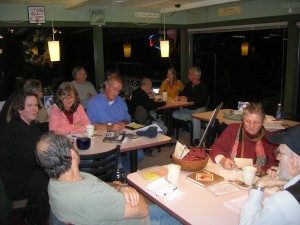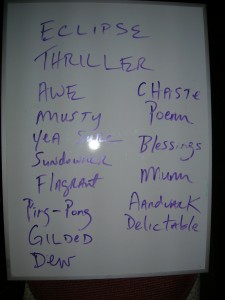In The Summer Weather
May 1924
At the grave on Memorial Day
they remembered Albert.
My mother said to me,
one relative of ours died in an accident
down on the waterfront.
For August, Labor Day Weekend 1924 –
the Order of Runeberg planned a songfest,
Swedish-Finnish Runeberg Choirs from Tacoma,
and Olympia, and Hoquiam and Aberdeen,
would sing, and their rehearsals began.
I took Swedish at the University of Washington.
Older, a Swedish class at First Lutheran Church
a song about the fox,
how the fox crept over the ice.
Räven raskar över isen.
For vi löv? May I have permission?
Can I be in the choir?
Linnea said to Auntie.
Auntie came up from Grandma
and Grandpa’s house, where the choir
first began in 1913 – their
Swedish-Finnish choir,
next door and they rehearsed.
Elmer and Carl bases, Al a tenor,
Linnea, Ma and Auntie, singing.
June 1924 THE READING CERTIFICATE
At the address on Commerce
where the American Legion Assembly Room
once was, there now
is a Hookah Smoking Caterpillar,
the Cobra Lounge.
It is a Hookah Lounge
where once Linnea Gorde
played A La Bien Aimee.
and the Cobra must change
the caterpillar’s Hookah Hose
Stems and leaves
into a stinging snake. And is it
about the stigma of things of the East?
In 1924 although experiencing
English Only Laws, the Catholics, Jews,
and the Lutherans were to lay aside
differences and Initiative 49,
brought forward by the Ku Klux Klan
to abolish private schools, was to be defeated.
There was a list of appropriate books
for her grade level, because by June
she had read ten. She could sit on her bed
she could sit at the table
she could sit with her feet up on the sofa.
Can one of these books have been
Alice in Wonderland?
She pasted into the scrapbook
her reading certificate from Tacoma Public Library
and Tacoma Public Schools.
Although the news held stories
of Ku Klux Klan rallies, of robes and hoods,
of crosses burning,
Initiative 49 was to go down to defeat.
July 1924 – Kingfisher Lodge
Elmer, Al,
Carl and Ray, Linnea and Gilbert
camped on the beach
where Birger and Eric lived.
Birger and Eric were brothers
of their father and Uncle Albert.
Birger and Eric worked at an island quarry
and they lived in a house on the beach.
Linnea’s piano teacher’s studio
was downtown at the Bernice building,
down the street from the Assembly Room.
Auntie waited while Linnea had her lesson.
Her teacher said to Linnea
with happiness, you are very good Linnea.
Or, you are very good, so you must practice
with diligence, because you have talent.
August 1924 THE SONGFEST IN HOQUIAM
We rode the train through the forest,
Linnea might well have said.
Linnea might well have said this
to her daughters. However, she was
a talented piano player, and the sound
was more likely to be Sommardansen.
Or, we rode in cars through the forest.
Or, we rode in the hired bus
through the forest to Aberdeen,
we rode in the hired bus, an arm
at the open window, in our everyday
dresses, and we rode on beyond
Aberdeen to Hoquiam. We were there
two nights, the songfest was all Labor Day Weekend.
The grand chorus sang, and the piano soloists
Linnea had to notice, were very pleasant
to listen to, and Linnea could believe
that she could do as well herself.
In the Aberdeen Electrical Park
nearby those people,
with the fires and the white hoods
were gathered, and all the women
exclaimed about this, nervously, then
quieted themselves and said something about
not letting it bother us.
The grand chorus sits for the photograph,
ladies in shades of white
men in black suits with neckties
in front of the B Street Finnish Hall,
Al on one side. Elmer and Carl on the other.
Al had been in soccer in the Stadium Annual.
Jones Photography, Gray’s Harbor .
In the paper from the area, The American,
a column on the front page
describes the KKK Labor Day Celebration
at the Electric Park,
an amusement park, in Aberdeen
and a column on the front page
describes the Songfest,
the Order of Runeberg Songfest.
One could attend one,
or one could attend the other.
In the paper the KKK was to have fireworks.
The Lodge was at
The Hoquiam Masonic Hall
a new hall built the year before in 1923.
I wonder if the Lodge took everyone
to the ocean beach.
In November the election results
for Initiative 49 in Hoquiam and Aberdeen
were almost 50 – 50,
but Initiative 49 was defeated.
Slumrande toner fjärran ur tiden
toner i från stugor, från fält och vänen lid.
sang the choir. They sang in Swedish,
it was a foreign language.
Songs can lie sleeping, distant,
far from time.
Songs from the cabins, from fields
and times so sweet.
September 1924
There is a saved letter and its envelope
that came one September day.
I find it is hard to interpret
all of it. But Faster Emelie
father’s sister, thanks them
and says she would have written sooner
about her brother Albert. But every time
she tried she began to cry instead.
“In The Summer Weather” is a middle section to a poem in progress, and refers to, among other sources, Thomas R. Pegram’s One Hundred Percent American The Rebirth and Decline of the Ku Klux Klan in the 1920s; The American, a newspaper from the 1920s in the Gray’s Harbor area; and to the Photo Archives at the Northwest Room of the Tacoma Public Library for references to the 1920s American Legion Assembly Room.
Laura Jensen‘s collections include Bad Boats from Ecco Press (1978) and Memory (1982) and Shelter (1985) from Dragon Gate Press. Memory was reprinted by Carnegie Mellon University Press in their Classic Contemporaries in 2006. Her work has been included in the anthologies In Tahoma’s Shadow: Poems from the City of Destiny (2009), Longman Contemporary Poetry (2nd ed.; 1989), and Northwest Variety: Personal Essays by Fourteen Regional Writers (1987). In 1996 Jensen helped create the Distinguished Poet Series. Jensen has been awarded grants from the National Endowment for the Arts, the Guggenheim Foundation, the Ingram Merrill Foundation, the Washington State Arts Commission, and the Lila Wallace-Readers Digest Fund. She lives in Tacoma and blogs at http://spicedrawermouse.blogspot.com/.

 he name refers to a series of cascades and waterfalls on the river, as well as to the native settlements and trading villages that existed there in various configurations for 15,000 years. Celilo was the oldest continuously inhabited community on the North American continent until 1957, when the falls and nearby settlements were submerged by the construction of
he name refers to a series of cascades and waterfalls on the river, as well as to the native settlements and trading villages that existed there in various configurations for 15,000 years. Celilo was the oldest continuously inhabited community on the North American continent until 1957, when the falls and nearby settlements were submerged by the construction of 
